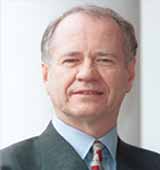|
Executive Interviews: Interview with Samuel E Bodily on Decision Making
May 2008
-
By Dr. Nagendra V Chowdary
 Samuel E Bodily
Samuel E Bodily John Tyler Professor of Business Administration at The Darden School, University of Virginia. 
You had been offering courses on
decision analysis and management
decision models for several years
now.What do students get to learn in
these courses?
In the core required course, students
learn basic decision analysis, with
decision trees, probabilities, NPV for
cash flows, and evaluation of risk
profiles. The standard ideas
regarding valuing information, and
making downstream decisions come
out in this course. Along the way,
they gain skill in structuring
decisions in spreadsheets,
forecasting discrete and continuous
uncertainties, and building and using
simulation models with Crystal Ball
in the spreadsheet.
|
|
We also
incorporate competitive analysis,
where we do the game theory payoff
matrices, and analyze the behavior of
both competitive players.
Inmy elective, Management Decision
Models, we consider preference for
risk and the use of expected utility,
real options, and optimization with
uncertainty and simulation. We also
extend the problem domain to
include dynamic models that extend
over time, with state variables and
random walk models. This provides
for a rich discussion of the simulation
of uncertainties over time, exposure
and correlations, hedging, and
discrete event simulation.
Throughout the course, we develop
general modeling skills and
experience with a decision quality
process.
-
Are there any tools/mathematical
models/decision trees, etc. that the
students are taught? Was there a
danger of tools being mistook as the
decisions themselves?
In our courses, we use cases daily
and a learning process that expects
them to develop good judgment.
Students understand that the
analysis is done for insight that may
lead them personally to a decision,
but that the analysis is not an answer
machine. We consider how sensitive
the choice is to various assumptions
in their models. Students work to
understand how to do their own
analysis and the analyses of others,
thenmake their own choices.Wemay
end a class with differing views on
what should be done. -
Is decision making a science or an
art? If it is to believed as science, can
its principles be applied universally?
If it is an art, how can someone be
trained to be an effective decision
maker?
Yes It is a science and an art. The
science part is taught with immersion
into methods and concepts. The art
part can only be conveyed by doing.
In my elective, we employ a kind of
modeling studio. It is not art
appreciation; it is watching each
other build models as we build our
own and gaining an eye for an
insightful model and developing the
judgment of an effective decision
maker. -
In today's corporate environment,
executives are often not willing to be
so decisive, as they fear mistakes and
the resulting fallout.At the same time,
there is zero tolerance for indecision,
lapses in integrity, and, above all,
weakness—all of which can be career
ending. How should executives/
leaders engage in a (delicate)
balancing act of decisiveness and
indecision; overconfidence and
insufficient confidence? Would
anticipatory regret hinder
decisiveness?
Part of our core course are exercises
where students make forecasts and
observe the common result that their
forecasts exhibit overconfidence—
i.e., 40-50% of outcomes fall outside
their 90%-confidence region. They
learn to express their forecasts with
wider ranges. Yet, they also learn how
to make decisions in conditions of
uncertainty. They see that a good
decision does not guarantee a good outcome and a good outcome does
not guarantee that a good decision
was made. Over many decisions and
many outcomes, however, you can
see patterns of good and bad choices.
They learn not to be paralyzed by
uncertainty and to decide in the face
of many possible futures. -
What is the role of business
schools in preparing better decisionmakers?
What specific steps do you
suggest for business schools in terms
of designing their curricula and
delivering focused courses to prepare
better decision makers?
Not all business schools teach
decision analysis, Monte Carlo
simulation, and how to use them for
risk analysis. They should.
1.
Decision Making Case Study
2. ICMR
Case Collection
3.
Case Study Volumes
|
